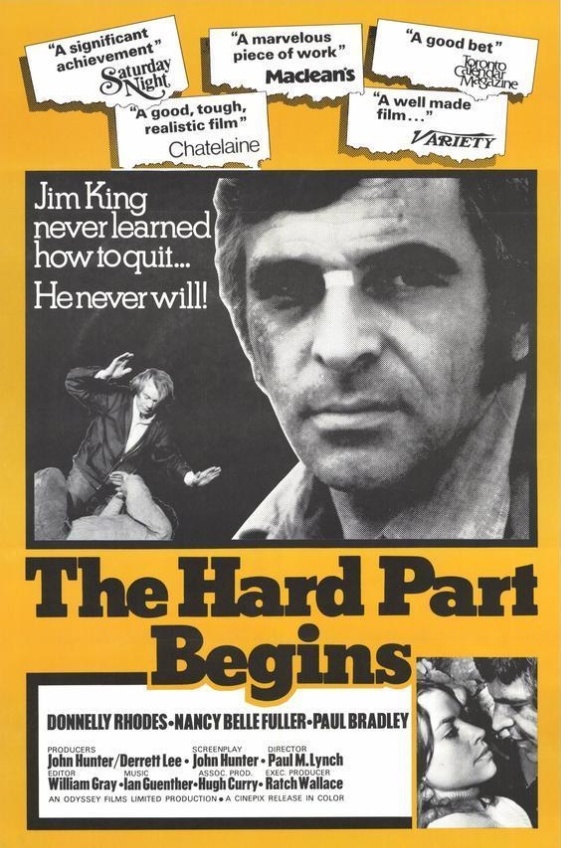
The Hard Part Begins (Canada, 1973) 85 min color DIR: Paul Lynch. SCR: John Hunter. PROD: John Hunter, Derrett Lee. MUSIC: Ian Guenther. DOP: Robert Saad. CAST: Donnelly Rhodes, Nancy Belle Fuller, Paul Bradley, Linda Sorenson, Robert Hawkins, Doug McGrath, Neil Vipond. (Cinepix)
Ghosts come back to haunt country singer Jim King (Rhodes) when his band King And Country plays a gig in his home town. The bittersweet experience of “coming home” is beautifully rendered in John Hunter’s screenplay, as King will confront a lot of ugly truths about himself.
His professional and personal relationship with pretty young co-singer Jenny Frame (Fuller) is seen at its best and worst. Jenny, who is becoming a star in her own right, gets mad when King sees his ex-wife Alice about problems with their son. (These scenes with Jim’s ex, and visiting his son at the correctional institute, are correctly full of resentment and awkwardness.) Conversely, King doesn’t tell Jenny that a record company wants to sign her, because he knows he needs her to boost his flagging image.
Even smaller roles have a complexity as real people do: full of love and hate, optimism and frustration within seconds of each other. Bit parts are given three-dimensional characterizations free of the “small town yahoo” clichés, like the guy who gets to fill in on stage, or the waitress with a wink.
Of course, we get to see all the shades of Jim King, who is an amiable, perpetual screw-up. He is an over-the-hill entertainer who is running out places to play, as entrepreneurs succumb to booking rock and roll to stay in business. He struggles to keep his act together at the expense of his bandmates’ own future successes. The two scenes in which Jim visits his dying former partner Hank Riley (Vipond) are symbolic of the vanishing old guard. Although Kind has a touching romance with Jenny, he thinks nothing of having a fling with an old flame.
Despite one vital change at the climax, the film has no real ending. It just stops. Some conflicts remain unresolved. As in life, not everything gets taken care of in one weekend. The music and crowd noise continue as the credits roll. What we have just witnessed has great consequence, but it’s another day, and life ambles on.
This film has a special resonance for me, as I grew up 25 miles from the Brant County area where it was shot. Paul Lynch (in his feature directing debut) and cinematographer Robert Saad perfectly capture the small-town Ontario milieu. It’s about the moments between the plot; the nostalgia and melancholy in its backdrop of diners, cheap motels and bars; the knowing slow death of small towns that people leave for supposedly greener pastures.
There must’ve been a law that early 1970s English-language Canadian films had to feature one of the stars from Goin’ Down the Road. Amusingly, this one features both of them. Paul Bradley plays Duane, the steel guitar player, whose devil-may-care attitude is good for some comic relief, but is perhaps the film’s most responsible character. I love that funny-real scene where he blows up at the stoned-out hippy drummer Lou (Hawkins) for suddenly leaving to join a rock and roll band. Doug McGrath has a couple of scenes as lunkhead Al Dawson, who accuses Jim of getting his sister pregnant, and pressures him into making an honest woman out of her.
For such a movie to work, the music must be good, and Ian Guenther’s wonderful song score is full of small-town melancholy and wistful searches for love. (I have the soundtrack album.) The film’s only misstep in authenticity is that the two leads’ singing voices are not their own.
Our cinema showed great promise of a Canadian New Wave, circa 1968 to 1973, with films so fresh and un-self conscious. Alas, many of its rising stars would work in tax shelter movies or episodic television to fill their careers. Like many of its characters, The Hard Part Begins is evidence of a great promise that sadly went unfulfilled or misused, but this gritty gem remains a fine example of its era.
I first viewed the film on (I believe) a Pan-Canadian VHS rental. It was later shown in letterboxed format on Bravo, and on The Showcase Revue, presented by Chas Lawther (where I taped a copy). I was fortunate to have also caught the film at Bell Lightbox, for a 2012 revival screening, shown in a 4×3 16mm print, ending with an appearance by director Paul Lynch, and a couple of supporting cast members.
